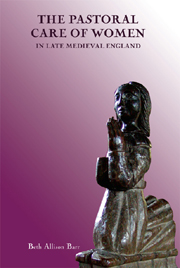Book contents
- Frontmatter
- Contents
- Miscellaneous Frontmatter
- Acknowledgments
- List of Abbreviations
- Introduction: “Be it husband, be it wife”
- 1 Pastoral Vernacular Literature
- 2 Pastoral Language
- 3 Pastoral Perceptions
- 4 Pastoral Care
- Conclusion: Gendered Lessons
- Appendix I The Manuscripts of Mirk's Festial
- Appendix II The Exampla of Mirk's Festial
- Bibliography
- Index
4 - Pastoral Care
Published online by Cambridge University Press: 12 September 2012
- Frontmatter
- Contents
- Miscellaneous Frontmatter
- Acknowledgments
- List of Abbreviations
- Introduction: “Be it husband, be it wife”
- 1 Pastoral Vernacular Literature
- 2 Pastoral Language
- 3 Pastoral Perceptions
- 4 Pastoral Care
- Conclusion: Gendered Lessons
- Appendix I The Manuscripts of Mirk's Festial
- Appendix II The Exampla of Mirk's Festial
- Bibliography
- Index
Summary
CLEARLY authors of pastoral vernacular literature recognized their responsibility to women. They understood that “Christ's people’ included both men and women; they perceived the women they served in a somewhat realistic light; and, as this final chapter demonstrates, they attempted to offer women proper pastoral care. At the same time, female parishioners presented priests with unique challenges that complicated the pastoral care process.
John Mirk's Instructions for Parish Priests illustrates these points well. First, it recognizes women as ordinary parishioners who required ordinary pastoral care. Twice Mirk stressed that priests should impress upon both men and women the need for confession. In the introduction, he wrote:
Thus you must also often preach,
And your parishioners carefully teach:
When one has done a sin,
Look he lie not long therein,
But immediately that he him shrive [confess],
Be it husband, be it wife,
Lest he forget by Lenten [Easter] day,
And out of mind it go away.
Later, under a section entitled De modo audiendi confessionem, Mirk reiterated that priests must be prepared to care for male and female penitents.
Now I pray you take good heed,
For this you must necessarily know,
Of shrift [confession] and penance I will you tell …
For often you must penance give
Both to men and to women.
Second, Mirk encouraged priests to exercise special caution with women, because of their sexuality. He warned priests about fraternizing with questionable women.
- Type
- Chapter
- Information
- The Pastoral Care of Women in Late Medieval England , pp. 94 - 120Publisher: Boydell & BrewerPrint publication year: 2008



